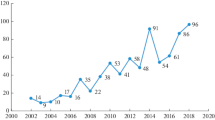Abstract
The paper summarizes the results of the recently completed project to derive a Research Core Dataset (RCD) for the German science system. It describes the basic principles and the architecture of the specification by introducing its main components and elements and by depicting the provisions with regard to aggregate and base data. In this context, the paper also explains the peculiarities of the German science system and the need for standardization given institutional heterogeneity and highly fragmented institutional reporting activities. The paper concludes with a short outlook on the potential chances and risks of the RCD to promote data integration and efficiency in reporting by research institutions in Germany.


Similar content being viewed by others
Notes
According to the German Rectors Conference; see http://www.hochschulkompass.de/hochschulen/download.html; accessed 19 October 2015.
The RCD project (German title: “Definition des Kerndatensatzes Forschung (KDSF) für das deutsche Wissenschaftssystem”) was coordinated by the Institute for Research Information and Quality Assurance (iFQ) (which is now a branch of the German Centre for Higher Education Research and Science Studies—DZHW) in cooperation with the German Council of Science and Humanities and the Fraunhofer-Institute for Applied Information Technology (FIT). It was funded by the Federal Ministry for Education and Research. More information can be found on the website of the project: see http://www.forschungsinfo.de/kerndatensatz/en/index.php?home; accessed 19 October 2015.
See recommendations of the German Council of Science and Humanities (2016) for complete listings of the aggregate and base data, underlying definitions as well as useful context information on the RCD standard.
References
Biesenbender, S., & Hornbostel, S. (2016). The Research Core Dataset for the German science system: Challenges, processes and principles of a contested standardization project. Scientometrics, 106(2), 837–847. doi:10.1007/s11192-015-1816-y.
Bittner, S., Hornbostel, S., & Scholze, F. (eds.). (2012). Forschungsinformation in Deutschland: Anforderungen, Stand und Nutzen existierender Forschungsinformationssysteme. Workshop Forschungsinformationssysteme 2011. iFQ-Working Paper, No. 10.
Breitbach, M. (2009). Empfehlungen zur Gestaltung von Steuerungssystemen auf der Ebene Land/Hochschule. Arbeitskreis der deutschen Universitätskanzler(innen): Leistungsorientierte Mittelverteilung und Zielvereinbarungen. http://www.uni-kanzler.de/fileadmin/Dateien/UAK1_Publikation-1(1).pdf.
DINI AG Research Information Systems. (2015). Research information systems at universities and research institutions—Position paper. Zenodo. doi:10.5281/zenodo.17491.
German Council of Science and Humanities. (2013). Empfehlungen zu einem Kerndatensatz Forschung (Drs. 2855-13), Berlin, Germany. http://www.wissenschaftsrat.de/download/archiv/2855-13.pdf.
German Council of Science and Humanities. (2016), Empfehlungen zur Spezifikation des Kerndatensatz Forschung (Drs. 5066-16), Berlin, Germany. http://www.wissenschaftsrat.de/download/archiv/5066-16.pdf.
Glänzel, W. (2015). The Challenge of Data Collection, Harmonisation and Standardisation for Use in Research Funding, Output Measurement and Research Assessment. Paper presented at the special session on “New frontiers and empirical evidence on the Efficiency, Effectiveness and Impact of Education, Research and Innovation” organised by C. Daraio at the 15th International Conference on Scientometrics and Informetrics (ISSI 2015), Boğaziçi University, Istanbul, Turkey.
Glänzel, W., Beck, R., Milzow, K., Slipersæter, S., Tóth, G., Kołodziejski, M., et al. (2015). Data collection and use in research funding and performing organisations. General outlines and first results of a project launched by Science Europe. Scientometrics, 106(2), 825–835. doi:10.1007/s11192-015-1815-z.
Nickel, S., Duong, S., & Ulrich, S. (2013). Informationsstrukturen zur Beurteilung von Leistungen in Forschung, Lehre und Studium: Akteure und Datenangebote in Deutschland. Gütersloh: CHE Gemeinnütziges Centrum für Hochschulentwicklung. ISBN 978-3-941927-45-2.
OECD. (2002). Proposed standard practice for surveys of research and experimental development—Frascati manual. Paris: OECD. doi:10.1787/9789264199040-en.
Quix, C., & Jarke, M. (2014). Information integration in research information systems. Procedia Computer Science, 33(2014), 18–24.
Riechert, M., Biesenbender, S., Dees, W., & Sirtes, D. (2016). Developing Definitions of Research Information Metadata as a Wicked Problem? Characterisation and Solution by Argumentation Visualisation. Program (forthcoming).
Wilsdon, J., et al. (2015). The metric tide: Report of the independent review of the role of metrics in research assessment and management. HEFCE. doi:10.13140/RG.2.1.4929.1363.
Author information
Authors and Affiliations
Corresponding author
Rights and permissions
About this article
Cite this article
Biesenbender, S., Hornbostel, S. The Research Core Dataset for the German science system: developing standards for an integrated management of research information. Scientometrics 108, 401–412 (2016). https://doi.org/10.1007/s11192-016-1909-2
Received:
Published:
Issue Date:
DOI: https://doi.org/10.1007/s11192-016-1909-2




